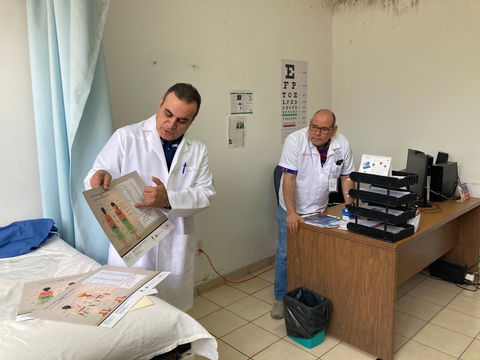
The SHIRE Lab is dedicated to exploring health, sickness, and immune function as social phenomena. Simply put, health is social. How we were raised and taught, our past and current social circumstances, and our social network(s) all affect how we think about and enact sickness. These factors can "get under the skin" to influence our physiological responses to stress and infection and dictate who we come into contact with (and which pathogens we encounter). We use a variety of methods, including biomarker analyses, to address these questions.

Wixárika Health
Started in 2019 (and with considerable delay due to COVID), this ongoing community-based research project focuses on health in rural and urban-living Indigenous Wixáritari (sing. Wixárika) in Jalisco, Mexico. Research to date includes sleep and self-reported health differences between Wixáritari living in Guadalajara and those living in a rural village, questions related to salutogenesis (that is, what is health and what do people do to stay healthy), and questions about culturally appropriate behaviors to take while sick.
Collaborators
Dr. Igor Martín Ramos Herrera, Universidad de Guadalajara
Dr. René Crocker Sagastume, Universidad de Guadalajara
Dr. Thankam Sunil, University of Tennessee
Dr. David Samson, University of Toronto
Leela McKinnon, University of Toronto
Tattoo Flu
If you have a tattoo yourself, you may have experienced flu-like symptoms (e.g., lethargy, aches, and so on) shortly afterward. This is "tattoo flu." Our team is working to quantify tattoo flu in order to understand how and why some people experience it and others don't, the immunological consequences of getting tattooed, and the role that tattoo flu plays in decisions about future tattoos. Tattoo flu - more specifically, the systemic inflammation occurring after tattooing - may also be a useful method for understanding the interplay between inflammation and motivation, a key component of sickness behavior.
Collaborators
Dr. Christopher Lynn, University of Alabama
Dr. Saige Kelmelis, University of South Dakota
Dr. Jessica Perrotte, Texas State University

.png)
Social Immunology
The social immunology framework (Shattuck, 2021) situates our body's immune system within larger social structures like social networks, economic and political systems, and even culture(s). While we know that some aspects of immunity - namely inflammation - can be affected by these factors, the SHIRE Lab will be exploring the impact of our social worlds on immune function itself.
Food Insecurity and Health in College Students
Unfortunately, food insecurity is a growing problem for American university students. Our team has collected data from three on childhood food insecurity, adult food insecurity, and multiple measures of health and wellbeing, including sleep and infectious disease symptoms. We have found connections between childhood food insecurity, psychological distress, and poor sleep, among other findings. Research will continue at FSU, highlighting the long-term impacts of past and current food insecurity on health.
Collaborators
Miriam Kopels, University of Nevada, Las Vegas
Dr. Casey Roulette, San Diego State University


Cultural Models of Sickness
Our behavioral responses to sickness - the decisions we make about when to stay home and when to go to work, when to seek treatment, and so on - are shaped by several factors, like our personal experience with sickness, the culture(s) we inhabit, and the medical systems we use. However, the cognitive/cultural models that shape these responses in the context of common infectious diseases like colds, flus, and even COVID are relatively unexplored despite their ubiquity and the shared biological experiences of symptoms and sickness behavior. The SHIRE Lab is working to define these shared cultural models across a variety of contexts, including among the Wixárika and the Hadza.
Collaborators
Dr. Alyssa Crittenden, University of Nevada, Las Vegas
Dr. Choeeta Chakrabarti, Florida State University
Meet the Lab
Lab Alumni
-
Carter Parent
-
Karolina Calderin Vargas
-
Aidan Wilson
-
Julia Matheny
-
Jake Markham






















